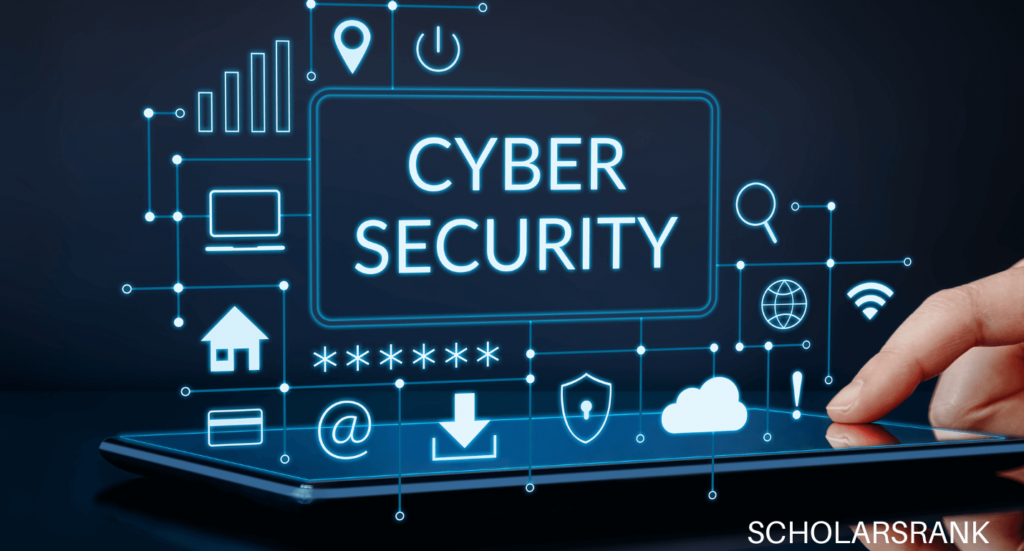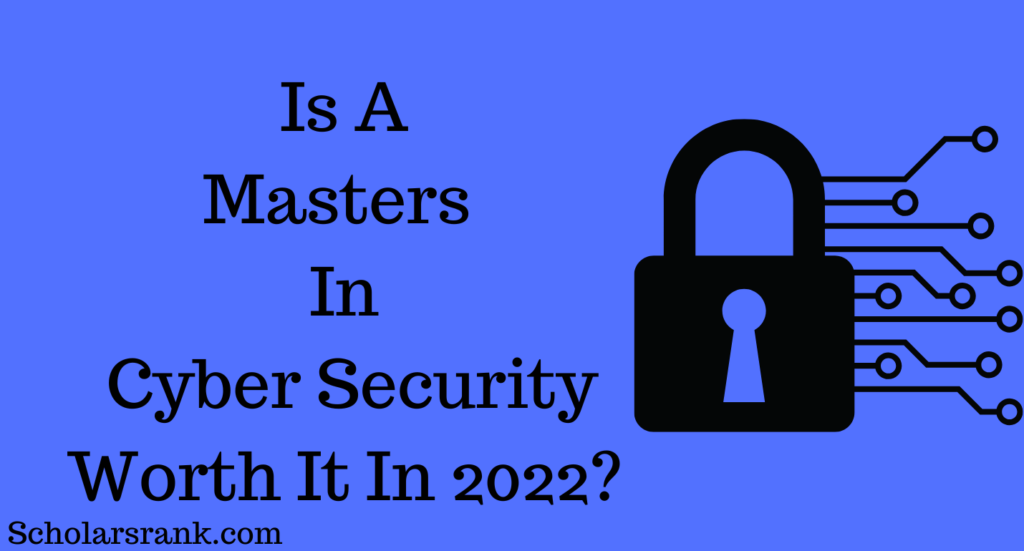Introduction
Is a masters in cyber security worth it? Few professions simultaneously provide as many intriguing career opportunities and extremely encouraging job growth forecasts.
If you have the necessary skills, credentials, and job experience, you might be able to get employment preventing cybercrime. In addition to working with the NSA or Homeland Security to identify and address cyber threats, experts in this sector can assist teams in defending big IT networks.
Consider pursuing a master’s degree in cyber security if you’re up for a technically demanding graduate program that could lead to fantastic career or growth chances in this industry.
Police defend us from actual crimes; who shields us from cyberattacks? These would be individuals in the field of cyber security who have earned degrees and certifications to be eligible for their jobs.
A bachelor’s degree or certifications may be all you need to work as a cyber security specialist. But, is a masters in cyber security worth it? Let’s analyze the reasons why a masters in cyber security is worth it.
How to Choose a Masters in Cybersecurity Program That’s Right for You
Here are just a handful of the factors that influence student decisions about master’s programs in cyber security. A master’s degree in cyber security may be a suitable option for you if you can relate to any of the following.
- You Desire Positions In National Defense Or Intelligence.
Increasing your knowledge of cyber protection could be a terrific approach to combining interesting computer work with volunteer activities. Working for a sizable federal agency, such as Homeland Security, the NSA, or the CIA, for instance, may pique your interest.
If you desire to eventually work in high-stakes, covert cyber command and response support or leadership roles, this career path may be extremely appealing.
- When You Graduate, You Want To Have A Solid Employment Market.
When your employment prospects are unclear, investing time and money in a graduate degree can seem dangerous. Fortunately, one of the industries with the biggest growth rate is cybersecurity.
Over the next ten years, cybersecurity jobs are expected to experience extraordinary job growth. As more businesses collect the data of their customers or users, the demand for specialists in this industry is set to rise.
- You Desire A Position That Matters.
To defend US businesses and many national US interests from an increasing surge of harmful cyber assaults, qualified cyber defense analysts and leaders have a key role to play.
If you’re an expert with computers and want to work in the public interest, you might want to think about pursuing a career in cybersecurity.
Is A Masters In Cyber Security Worth It?

For many students, earning a master’s degree in cybersecurity is worth it. Experts in cyber security defense may be in a good position to find open positions, competitive remuneration, and the satisfaction of carrying out important work in the coming decade because the stakes are so high when it comes to cyber security concerns.
Jobs for information security analysts are expected to expand by an amazing 31% over the next 10 years, according to the Bureau of Labor Statistics. Leaders in industry, government, and national security organizations can get assistance from experts in this field to combat malware, ransomware, and other types of harmful cyber intrusion and aggression.
Information security professionals sometimes work in high management positions. For large databases or other systems, senior professionals can assist with managing and implementing security rules and risk reporting methods.
Other typical jobs in the cybersecurity industry include those for professionals in cryptography, cybercrime forensics, and penetration testing. Your master’s school might let you add a concentration to your cybersecurity credentials, which could lead to more opportunities.
A concentration in criminal justice, software engineering, or development, for instance, can equip you for a job enforcing laws against cybercrime or creating new security software.
Reason Why A Masters In Cyber Security Is Worth It
A master’s degree requires significant time, effort, and financial commitment. However, if you’re dedicated to finishing your master’s degree in cyber security, it can significantly advance your professional prospects.
These are the main reasons for earning a master’s degree in cyber security.
- Your Wage Expectations Rise When You Earn A Master’s Degree.
Information security analysts earn $98,350 a year, with cyber security professionals generally commanding high median pay. You can position yourself for leadership roles and earn $156,583 annually in the top 10% of cyber security professionals by earning a master’s degree.
- A Master’s Degree Is A Permanent Certification.
An advanced degree demonstrates a commitment to your profession and to honing your skill set. It’s a concrete approach to demonstrating your skills to potential employers and a career-long investment that pays dividends.
- You Can Get Cutting-Edge Talents Through A Master’s Degree.
A field that is always evolving is cyber security. A master’s program can update your technical skill set while enhancing your critical thinking, problem-solving, and management abilities if you’ve been in this line of work for a long time or don’t currently specialize in cyber security.
- It Is Simpler To Switch Careers With A Master’s Degree.
By changing careers, you can benefit from stable employment and growth prospects in cyber security. A master’s degree is an excellent approach to demonstrate your knowledge and land a job in the subject of cyber security if you work in computer science or a similar technology field but do not specialize in it.
- A Master’s Degree Provides Access To Career Advancement Possibilities.
To oversee their cyber security initiatives, employers are searching for highly skilled experts. A master’s degree can be essential to differentiating oneself and moving up to management and executive roles, regardless of whether your career goals are to work for a major corporation, a freelance consulting firm, or in high levels of government.
The Necessary Skills for Cyber Security Jobs
- Detail Orientation
The capacity to pay attention to details is a vital skill for a cyber security specialist. To protect businesses from assaults and breaches, it is imperative in the field to identify vulnerabilities and weaknesses. Consequently, one must pay close attention to detail and maintain vigilance at all times. An expert is expected to identify errors and issues quickly and develop real-time security solutions.
- Problem-Solving Skills
A cyber security professional’s daily tasks will include dealing with complex security challenges. Therefore, in the sector of cybersecurity, having the aptitude and ability to solve problems is crucial. Professionals must approach the task with fresh perspectives and methods to tackle complexity.
- Core Computer Forensics Knowledge
Cyber security relies heavily on computer forensics. A vital necessity is to understand the ideas and to have a solid foundation in cyber security. One needs to be very knowledgeable about computer forensics to provide security measures and protect organizations’ digital assets. Because of this, the majority of online courses for cyber security have curricula that incorporate information on computer forensics.
- Technical know-how
Working in cyber security would require utilizing technologies to carry out technically complex operations because the area is technologically based. The work includes everything from updating security systems to detecting, managing, and driving networks to creating real-time security system solutions. Only someone who is technologically astute and familiar with digital technology can handle the aforementioned tasks. Consequently, you are familiar with the procedure.
- Security Expertise on a Wide Range of Platforms
The position of a cyber security specialist requires knowledge and proficiency across a variety of platforms, including mobile devices, operating systems, networks, the internet, and computer systems. One must also keep abreast of the most recent developments and trends in the field.
- Communication Capabilities
You’ll engage with people in a variety of roles and departments as a cyber security expert, so you’ll need to be able to successfully convey your findings, worries, and solutions to others. It’s essential to be able to communicate cyber security strategies and objectives clearly and effectively, as well as to impart technical information to staff members with diverse levels of technical skill.
- Open to Constant learning
Like any other technology area, cybersecurity is constantly evolving. Anyone employed by the company will need to be dedicated to continuing their education both on and off the job, as well as being up to date on industry trends and best practices.
- A Basic Understanding of Hacking
To effectively protect a company’s network and infrastructure, the majority of cybersecurity experts must learn how to “ethically hack.” You must have the same skills as a hacker to completely appreciate how a system could be compromised and, as a result, develop efficient countermeasures. The field of cybersecurity is here to stay and will expand in the foreseeable future, offering excellent work prospects to aspirants. Therefore, preparing for the career by taking a cyber security online course and receiving focused instruction will help you succeed.
Career Options For A Masters In Cyber Security
You may be qualified for a variety of professional responsibilities with a master’s in cyber security, so it can be useful to consider the expertise you wish to specialize in.
You might desire to pursue managerial positions, work in law enforcement as a cyber forensics expert, or assist a federal agency by being in charge of tactical cyber defense and response operations, for example!
- Data Scientist
Data scientists assist in the collection, analysis, and interpretation of data. They may manage, store, and make data accessible to other stakeholders so they may assist in decision-making. According to Pay-scale data from October 2021, the median annual compensation for data scientists was approximately $96,800. Data scientists should know statistics, several computer languages, and A/B testing.
- Penetration Tester
When evaluating the integrity of an organization’s cyber security, penetration testers look for weak spots in the network infrastructure. They do this to determine where resources should be placed to stop network invasions. Approximately $88,000 was their typical annual wage, according to data from Pay-scale collected in October 2021. Knowledge of scripting languages like Perl and Bash as well as a strong foundation in information technology and network security may be required.
- Cryptographers
Cryptographers study and work with sophisticated software algorithms. They use their knowledge of cyber security software to assess cryptography tools and techniques. The planning and execution of security measures for sensitive communications and data transmissions can be assisted by cryptographers.
- Chief Information Security Officer (CISO)
Any projects that relate to the overall security of an organization are chosen, supervised, and led by this c-suite management position. The standard for CISOs used to be an MBA with an IT specialization, but now that there are specialized master’s degrees in cyber security, these professionals can obtain an advanced degree that is suited to their jobs.
- Security Architect
These senior-level workers plan, create, and manage an organization’s network and computer security implementation. Additionally, you’ll be in charge of defining security policies and practices, cost and risk assessments, and technical guidance. A master’s degree in cyber security is the best course of study to get you ready for this position because security architects balance management and technical responsibilities.
- Information Security Analyst
Information security specialists create and put into place safeguards to protect networks. They earned a typical yearly pay of $103,590 in 2021, according to the U.S. Bureau of Labor Statistics (BLS), and they should be capable of conducting research, making plans, and explaining strategies to others.
- Security Software Developer
Developers of security software contribute to the creation of the platforms used by others to secure networks. To help ensure that everything functions as it should, they design to the specific needs of their organization. According to PayScale data from October 2021, the median yearly income for security software developers was around $73,500. It’s necessary to know coding languages like Python or Java.
- Security Consultant
This position develops and implements the finest security solutions following the requirements of each firm. This position is best suited for someone with a master’s in cyber security who has polished both their technical and interpersonal abilities. Duties will range from speaking with stakeholders and creating budgets to directing teams and doing security testing.
- Security Engineer
Develops and evaluates security systems, identifies IT threats and software vulnerabilities, and acts as the point of contact for security policies and procedures. Companies look for applicants with a minimum of a bachelor’s degree in cyber security and prefer candidates with a master’s degree in cyber security for progression due to the highly technical nature of this profession.
Understanding the Value of Certifications vs. a Master’s in Cybersecurity
Professional certifications are another factor to take into account when obtaining cybersecurity credentials. Many professionals ponder whether they ought to pursue a master’s degree, a professional certification, or a mix of the two. Here is a summary of the advantages and/or disadvantages of each kind of certification.
| Factors | Masters Degree | Certification |
| Duration | No expiration | Most require renewal within a few years. |
| Cost | One-time payment | Inexpensive but accumulates with time |
| Skill Measurement Criteria | Writing, conversations, critical thinking, and practical skills are used to measure skills. | Exams are used to measure skills. |
| Focus Area | A concentration that is broader and deeper | Emphasis on a particular task |
| Flexibility of Knowledge | Acquire practical knowledge | Depends, but much of the knowledge is non-transferable |
| Skills Demonstrated | Increases tenacity in learning | Aids in developing test-taking skills |
Alternative Masters Degrees in Cyber Security
You could be considering whether earning a master’s degree in a comparable subject might be more appropriate for you. Here are a few alternative master’s degrees that relate to cyber security but will help you prepare for different career paths.
| Masters In Cyber Crime | Masters In Information Technology | Masters In Software Engineering |
| You will study criminal justice principles as well as cyber security tools and techniques in a master’s program in cyber crime. If your objective is to work in cyber crime investigation and enforcement with governmental law enforcement agencies, this type of degree program may be an excellent alternative. | Your ability to manage sizable IT teams, networks, and systems can be improved with a master’s in Information Technology. You’ll probably study cyber security ideas as well as effective project management techniques connected to IT leadership as part of your education. Your education can prepare you to lead IT innovation for your organization in fields including data management and storage, digital automation, online collaboration, and the application of artificial intelligence to a variety of business goals. | A master’s in software engineering can be a useful alternative degree if you enjoy engineering, the scientific method, or working with empirical data to solve problems. You can get ready for careers at the forefront of cyber security software research and development with training in cyber security and a master’s degree in software engineering. To combat rapidly growing cyber threats, cyber security software engineers may introduce new software tools or new software concepts. |
You can determine whether a Masters in Cyber Security is the perfect degree for you by taking a look at a few alternative degrees. Your most significant professional preferences and aspirations may also be revealed.
Conclusion
Is a masters in cyber security worth it? A career in cyber security is a promising choice for technology experts due to the rising need for employment security, and high pay. You can distinguish yourself from other IT professionals who don’t have specialized credentials by earning a master’s degree in cyber security.
A master’s degree in cyber security opens up chances for new career paths. With better education, you’ll be able to climb the corporate ladder more quickly. The chance for job progression in an in-demand industry is one of the top advantages of having a master’s degree in cyber security.
A master’s degree in cyber security can introduce students to competent professionals in the field. There are better possibilities to network with professors, peers, or business people. Degree holders who network can obtain future employment and receive sage advice.
Frequently Asked Questions (FAQs)
Is Cyber Security Worth It In The Future?
- Recently, most organizations are not reluctant to offer substantial compensation packages because the demand for cyber specialists is high and because they have such a variety of skill sets. This job role has consistently been rated as one of the top ten highest- and best-paying jobs across a variety of industries.
Which Master’s Program In Cyber Security Is The Best?
- One of the most sought-after degrees for cyber security experts is a master of science. However, other students choose to enroll in programs that are closely related, such as a master’s in computer science with an emphasis on cyber security or a master’s in criminal justice with a concentration in digital forensics.
You can also read, “Is A Masters In Criminal Justice Worth It In 2023?“








